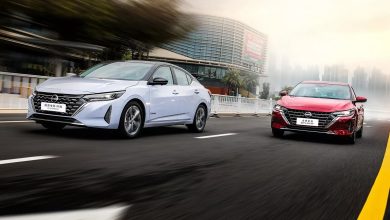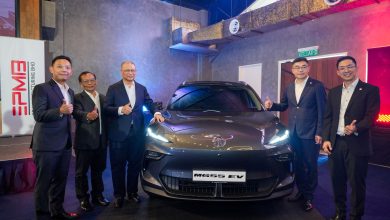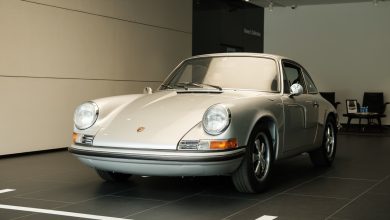BMW 2-Series Gran Coupe has just been unveiled
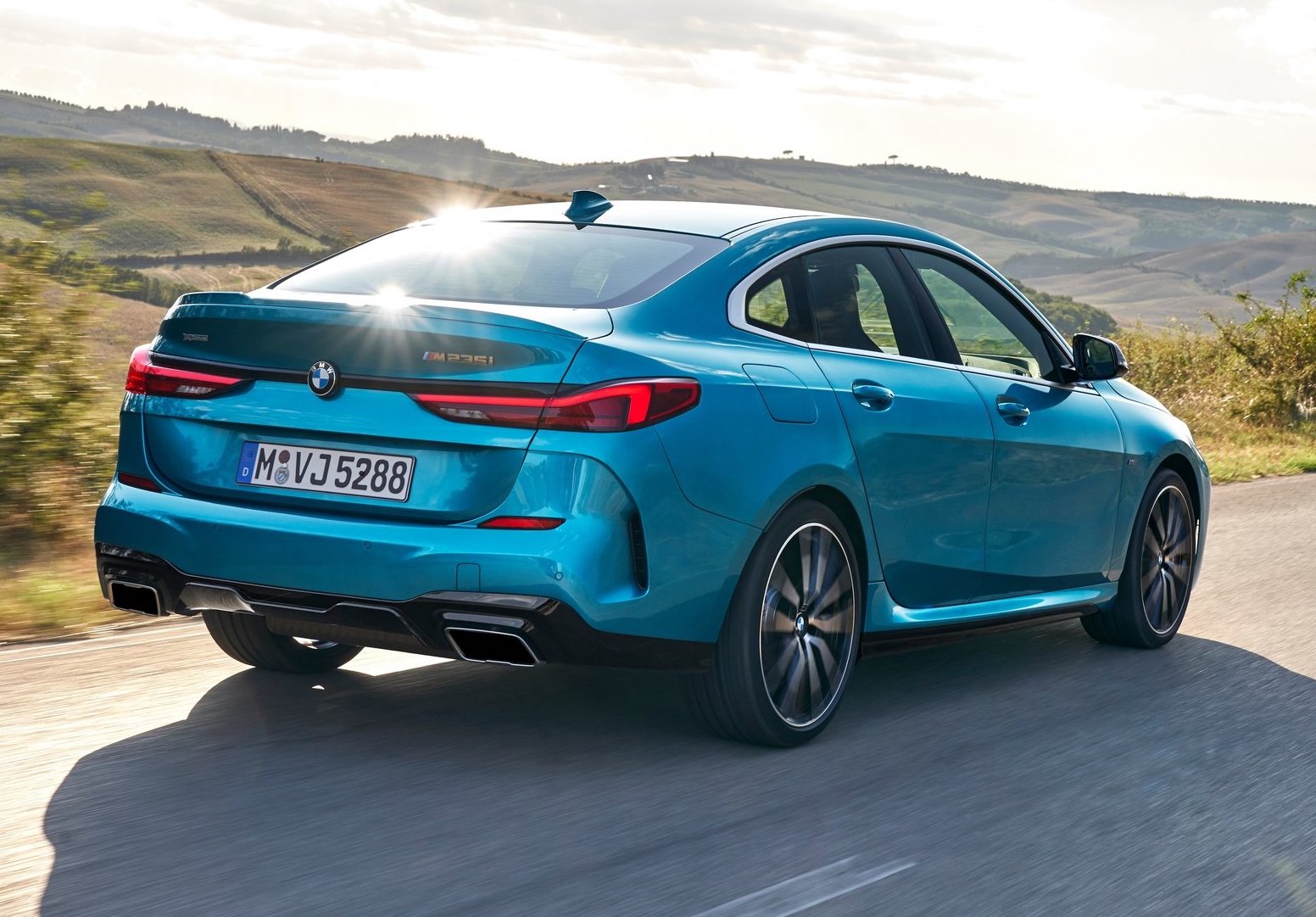
The all-new BMW 2 Series transfers the successful Gran Coupé concept to the premium compact class. The dynamically stretched silhouette, with frameless side windows on the four doors, gives a distinctive look to the BMW 2 Series Gran Coupé. This unique exterior is equipped with exclusive details such as the contoured kidney grille bars with eye-catching indentation, and the all-new design of the rear light.
The interior of the BMW 2 Series Gran Coupé combines sporting flair with exquisite materials and spaciousness. Modern, dynamic and high-quality details, an expandable 430-liter trunk, and a touch-sensitive, high-resolution Control Display provide utmost comfort for the driver and passengers alike.
Highlight features include optional extras like the BMW Live Cockpit Professional advanced driving assistant, the BMW Head-up Display that projects driving-related information onto an area of the windscreen, or the large panoramic roof with infinitely variable outward-opening action and electrically actuated ventilation mode.
The BMW 2 Series Gran Coupé vehicle is available in a basic variant and 5 other equipment lines, ranging from Advantage through to the Luxury Line and M Sport models. The vehicle comes with a choice of three enhanced engines, one diesel and two petrol, including the BMW Group’s most powerful four-cylinder engine.
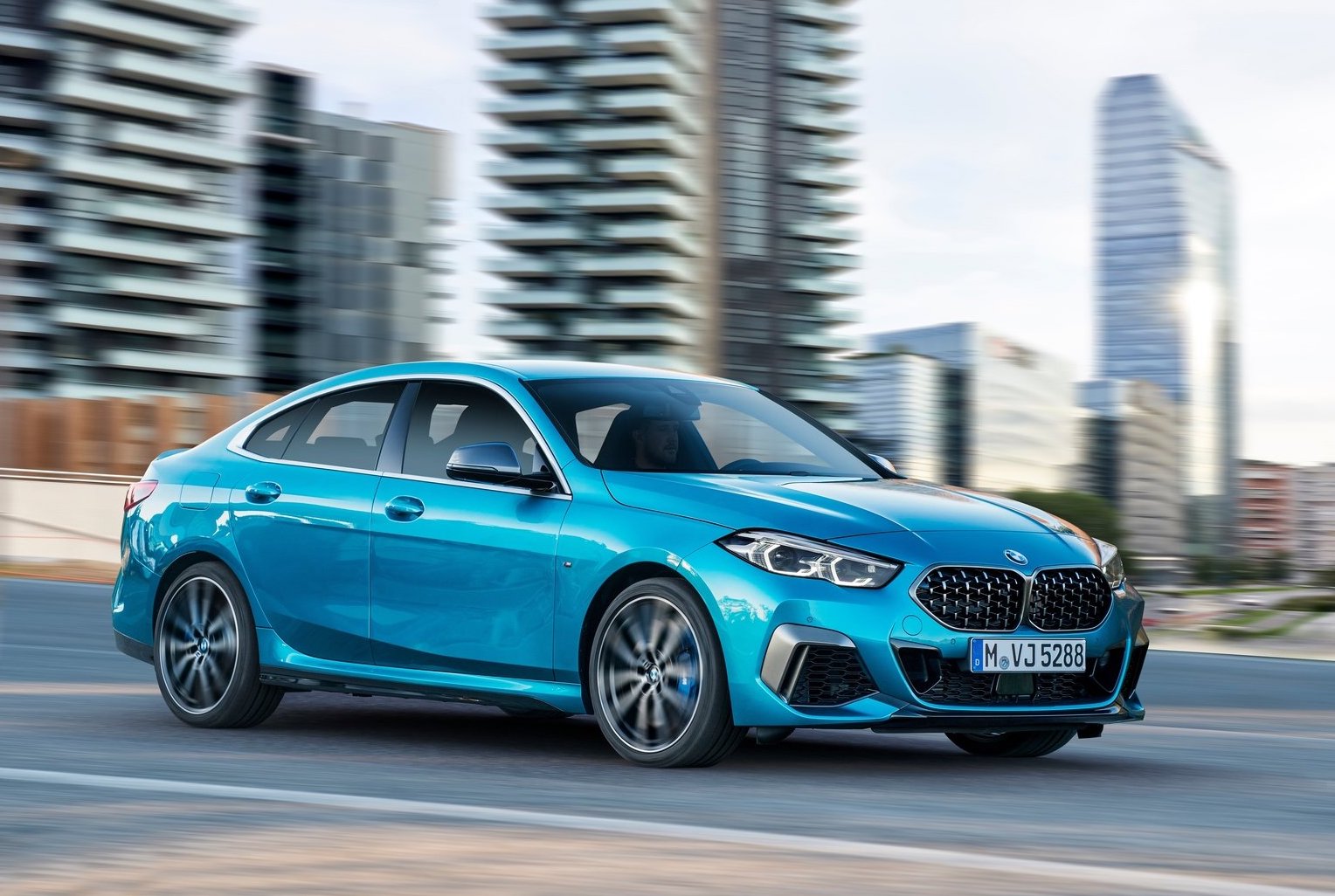
PRESS RELEASE: The success story of four-door BMW coupes began in 2012 with the BMW 6-Series Gran Coupe, which was followed two years later by the BMW 4-Series Gran Coupe. The new BMW 8-Series Gran Coupe has been available since September 2019. And the market launch of the BMW 2-Series Gran Coupe in early 2020 will complete the family line-up. Like its larger siblings, the BMW 2-Series Gran Coupe reveals a strong focus on design with bold, sporty and emotionally rich lines, frameless side doors and a highly expressive, flamboyant appearance. And it combines these elements with a high level of everyday practicality, including excellent interior space and a large load compartment.
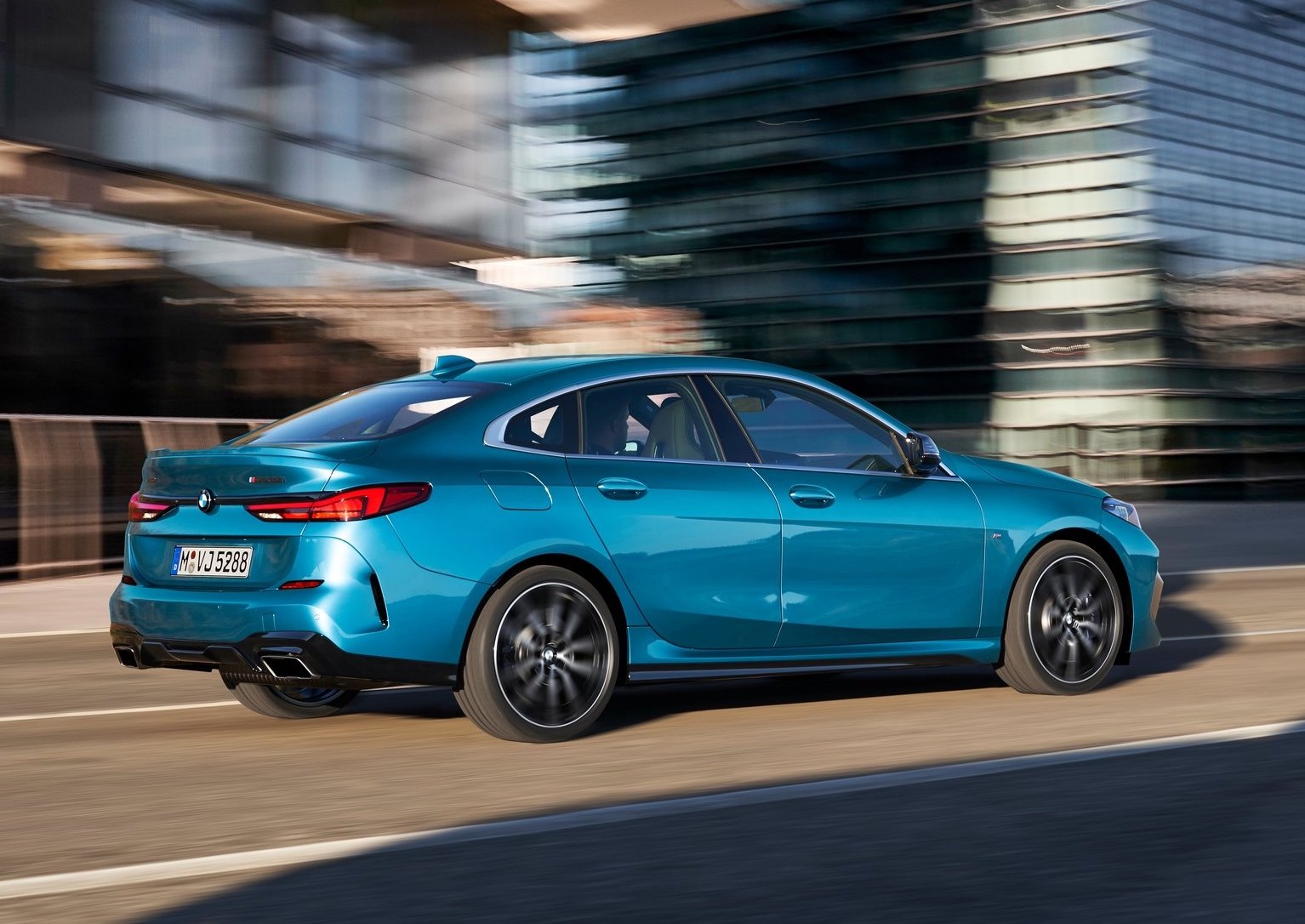
As its sporting looks imply, the BMW 2-Series Gran Coupe has its sights set on establishing the dynamic yardstick in its class. The advanced BMW front-wheel-drive architecture, which the BMW 2-Series Gran Coupe shares with the new BMW 1-Series along with an array of other technological developments, provides an outstanding toolkit for the job at hand. Furnished with cutting-edge chassis technology and innovative systems, e.g. in the field of control system technology, the four-door coupe raises the bar in terms of driving dynamics and agility. And in BMW M235i xDrive form it comes as standard with BMW xDrive all-wheel drive.
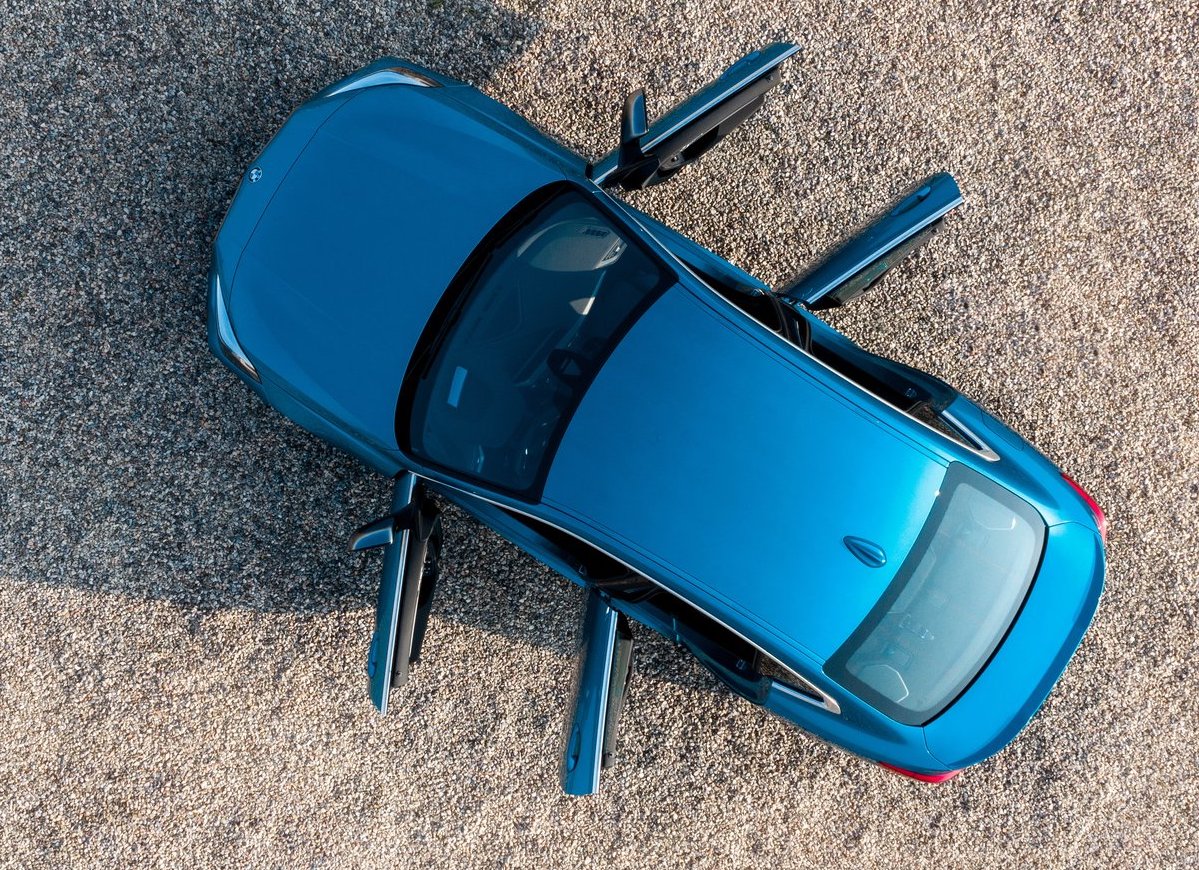
The BMW 2-Series Gran Coupe is the perfect choice for young, urban customers for whom sportiness, cutting-edge connectivity and ample on-board space rank highly.
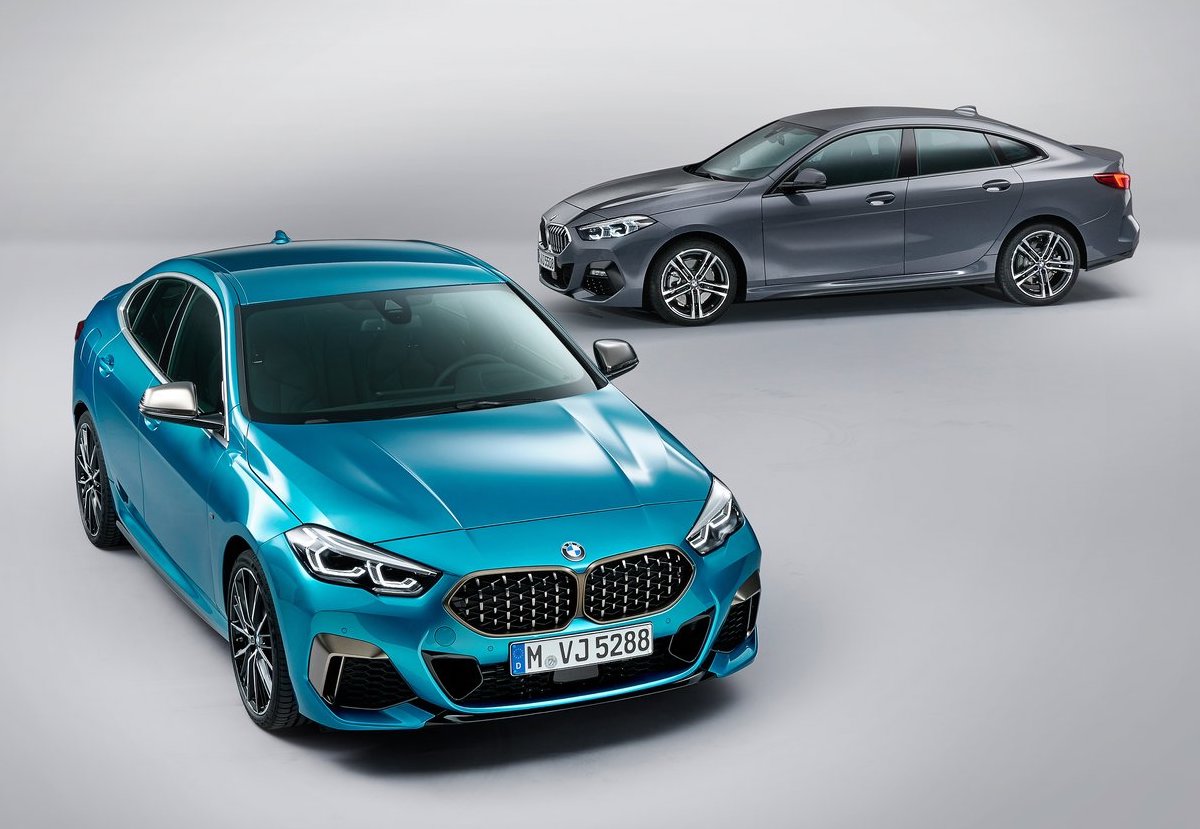
How Much?
Market launch will get underway in March 2020, with prices in Germany starting at €31,950 (RM147,775) for the BMW 218i, €39,900 (RM184,546) for the BMW 220d and €51,900 (RM240,000) for the range-topping BMW M235i xDrive.
Exterior
BMW is transferring its successful Gran Coupe concept from the BMW 6-Series, BMW 4-Series and BMW 8-Series ranges into the premium compact class for the first time. The new BMW 2-Series Gran Coupe seamlessly reprises the elegant, premium aesthetic championed by its larger stablemates and adds exclusive details such as contoured kidney grille bars with an eye-catching indentation, a mesh grille for the flagship BMW M235i xDrive and, most strikingly, the all-new design of the rear lights, which extend well into the centre of the rear end. They hand over to a High-gloss Black band, which runs up to and encircles the centrally located BMW badge. This combination of the rear lights and connecting element makes a horizontal statement and accentuates the width of the rear.
Classical coupe silhouette with frameless side doors
The standout characteristic of the BMW 2-Series Gran Coupe is its dynamically stretched silhouette which, like the frameless side windows for the four doors, is lifted from the classical coupe blueprint. The 2-Series Gran Coupe measures 4,526 millimetres in length and 1,800 millimetres in width, but stands just 1,420 millimetres tall. Despite its low-slung, sporty appearance, passengers are well catered for space-wise, thanks to the 2,670-millimetre wheelbase. Plus, the 430-litre load compartment can be expanded in various ways. All of this significantly increases the car’s range of applications day in, day out. Large surfaces and the use of just a small number of crisp lines provide the latest evidence of the new BMW design language at work.
Low, wide, sporty
The BMW 2-Series Gran Coupe has a sporty, low and broad-set stance on the road. Its confident appearance stems from the dynamic front end with its fresh interpretation of classical BMW icons. The slightly angled headlights with prominent BMW four-eyed face draw attention to the familiar BMW kidney grille. As on BMW coupes from higher up the model ladder, the grille takes the form of a large and connected element, as well as spreading out further to either side. In a styling tweak unique to the premium-compact four-door coupe, the kidney bars are contoured, an eye-catching vertical indentation in the bars providing a three-dimensional effect when the kidney bars are specified in Aluminium satinated. An exclusive visual identifier of the line-up’s sporting flagship – the BMW M235i xDrive – is its striking grille design with pronounced three-dimensional mesh in place of the classical bars. The mesh design is inspired by racing cars and brings extra depth and perceived quality to the front end. The outer air intakes are also larger on the BMW M235i xDrive.
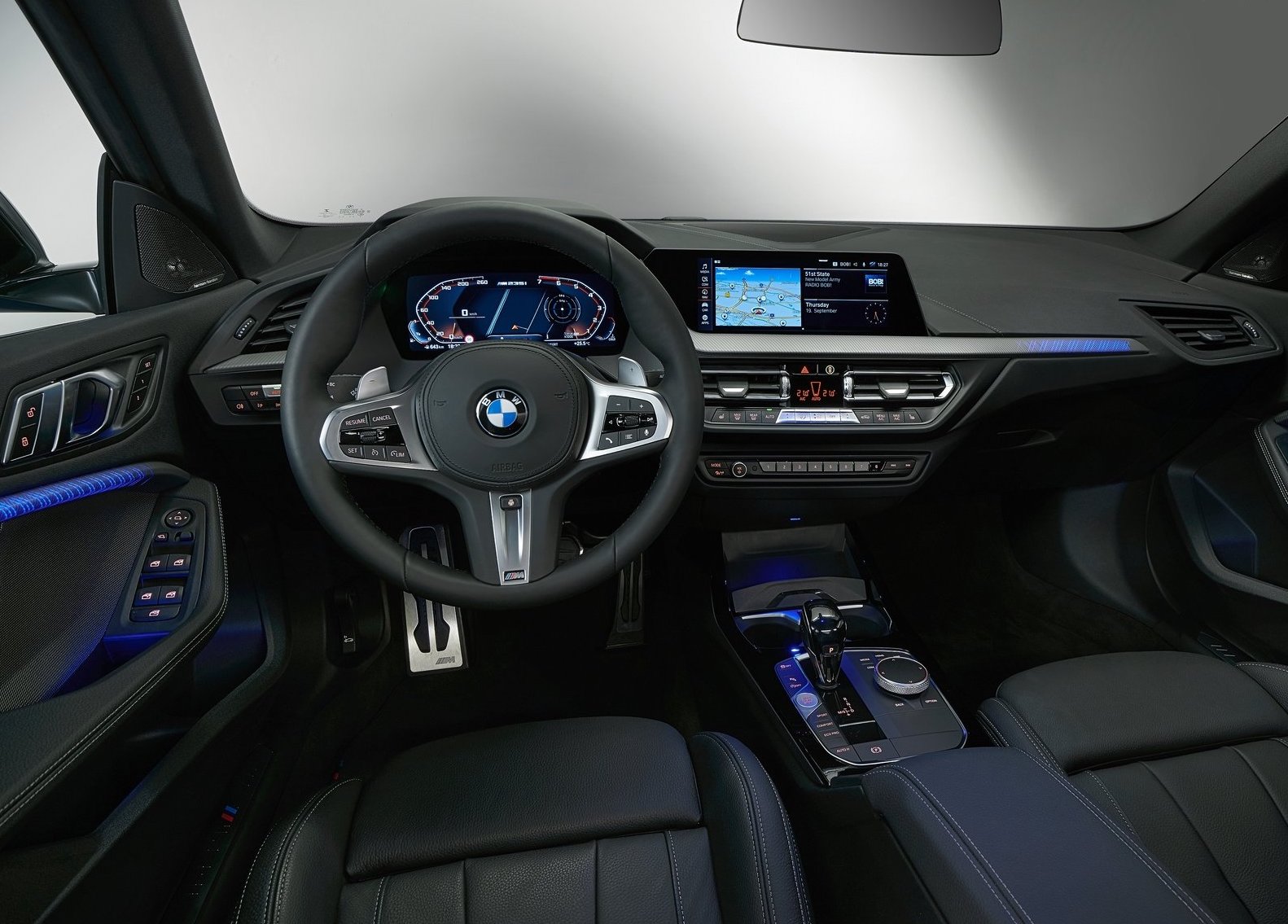
LED headlights fitted as standard
The BMW 2-Series Gran Coupe is equipped as standard with full-LED headlights, which lend the car an extremely modern expression. The transparent, hexagonal tubes of the daytime driving lights form a precise and technically striking interpretation of the signature BMW four-eyed front end. The “eyebrow” turn-signal indicators emphasise the width of the car, while the set-back headlight tubes exude dynamic performance. The upper section of the headlight housing has an aluminium look beneath the glass cover, while on the side is “BMW LED” lettering. The full-LED headlights can also be specified as an option in adaptive form.
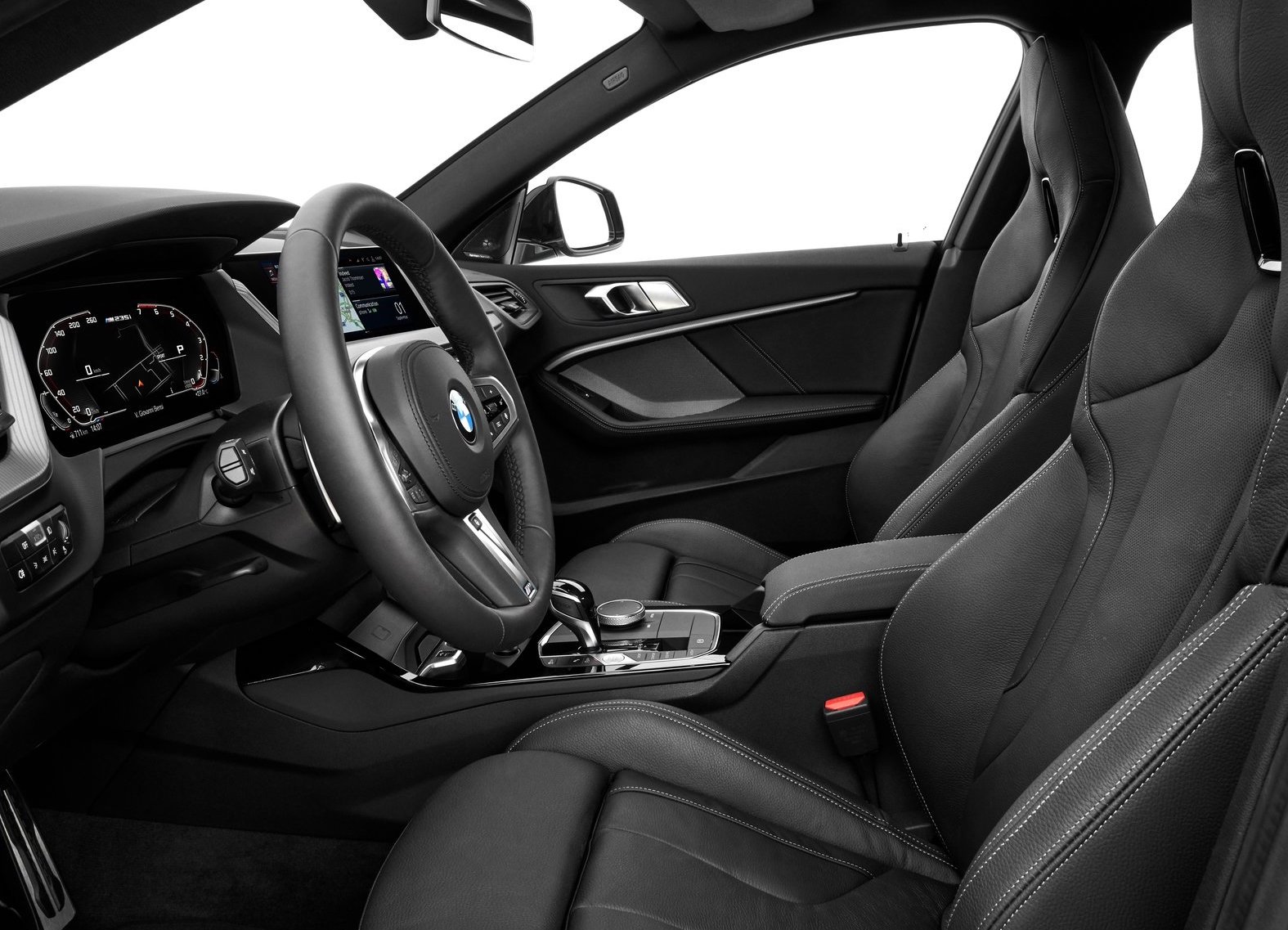
Flowing roofline and prominent shoulders
Precise lines in the flanks of the new BMW 2-Series Gran Coupe, creating a fascinating interplay of light and shade, emphasise the agile proportions and hallmark elegance of a modern BMW coupe. The roofline has a graceful flow, the long window graphic visually reduces the weight over the rear end and, further down, the shoulderline extending well back to the rear has an elongating effect on the body. In addition, a distinct side taper at the C-pillar injects a feeling of sportiness into the shoulder section above the powerfully contoured rear wheel arches. This also highlights the width of the car when viewed from the rear and gives it a broad stance on the road. The slim, horizontally extending rear lights reinforce this impression, especially in tandem with the High-gloss Black element connecting the two-section lights at the centrally positioned BMW badge. Like the headlights, the rear lights are full-LED as standard. They provide an all-new take on the familiar BMW “L” shape with a single slim light element and a distinctive sweep to the side. Arranged around this element behind the red glass cover are the turn signal repeater, brake light and taillight, reversing light and rear fog light. The pared-back overall look lends the rear end a classy sense of modernity also exuded by the elaborately shaped tailgate with four-piece styling. Chrome exhaust tailpipes with a diameter of 90 millimetres (the BMW M235i xDrive has striking free-form pipes) set the seal on the sporting aesthetic.
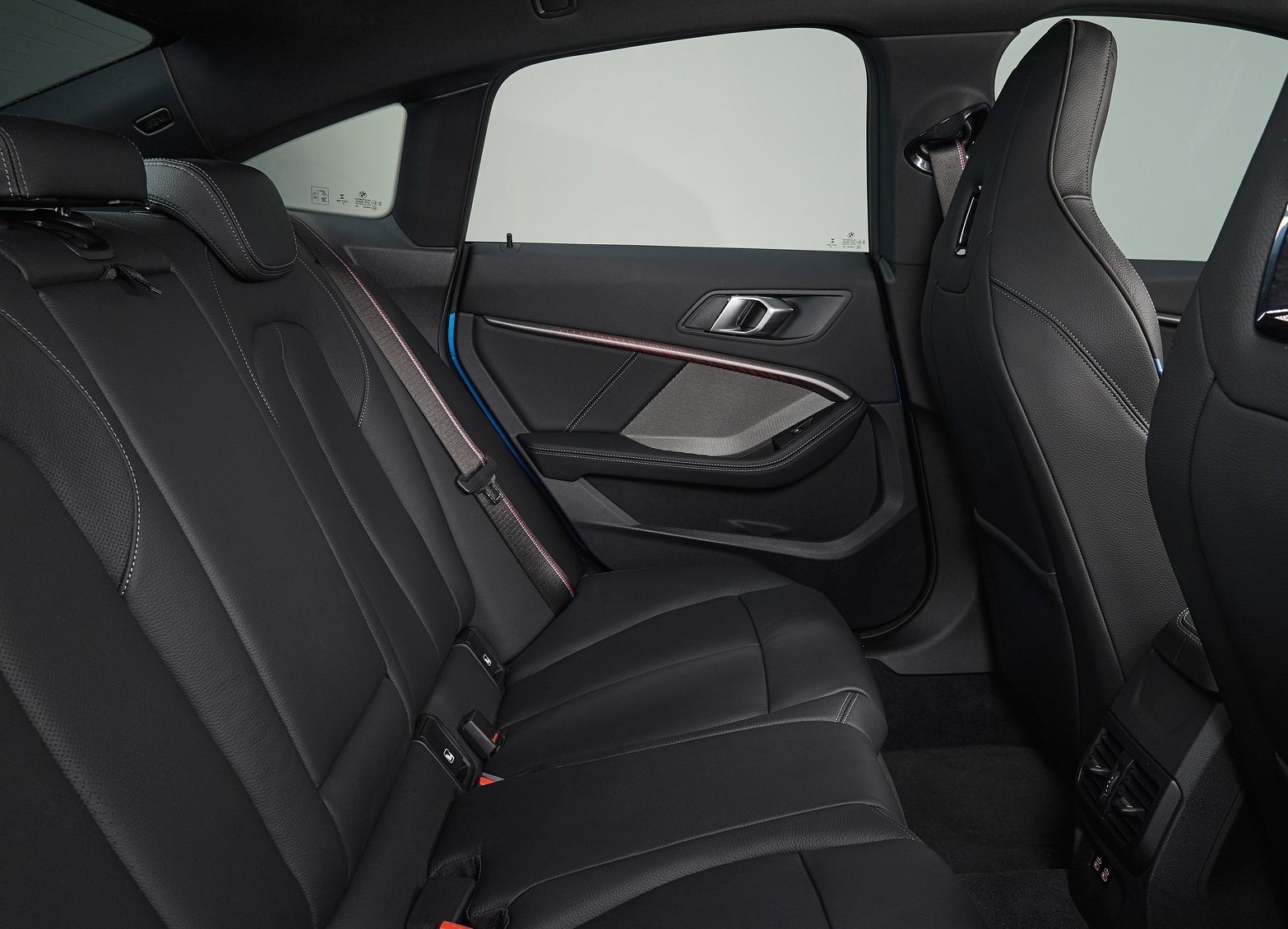
Up to 19-inch light-alloy wheels and large panoramic roof
All variants of the BMW 2-Series Gran Coupe will be fitted with light-alloy wheels with a diameter of at least 16 inches (entry-level model). Luxury Line and Sport Line cars come with 17-inch light-alloy wheels, the M Sport model and BMW M235i xDrive are fitted ex-factory with polished 18-inch light-alloy wheels, and polished light-alloy wheels with a 19-inch diameter are available as an option. A large panoramic roof is also available as an option. Featuring an infinitely variable outward-opening action and electrically actuated ventilation mode, the panoramic roof has a glass area of some 0.7 square metres. The opening in the headliner measures 74 x 72 centimetres and has an electrically operated roller blind to provide shading. A favourable acoustic environment can be maintained with the roof open thanks to a net wind deflector and a comfort position for the glass roof panel which keeps wind noise to a minimum.
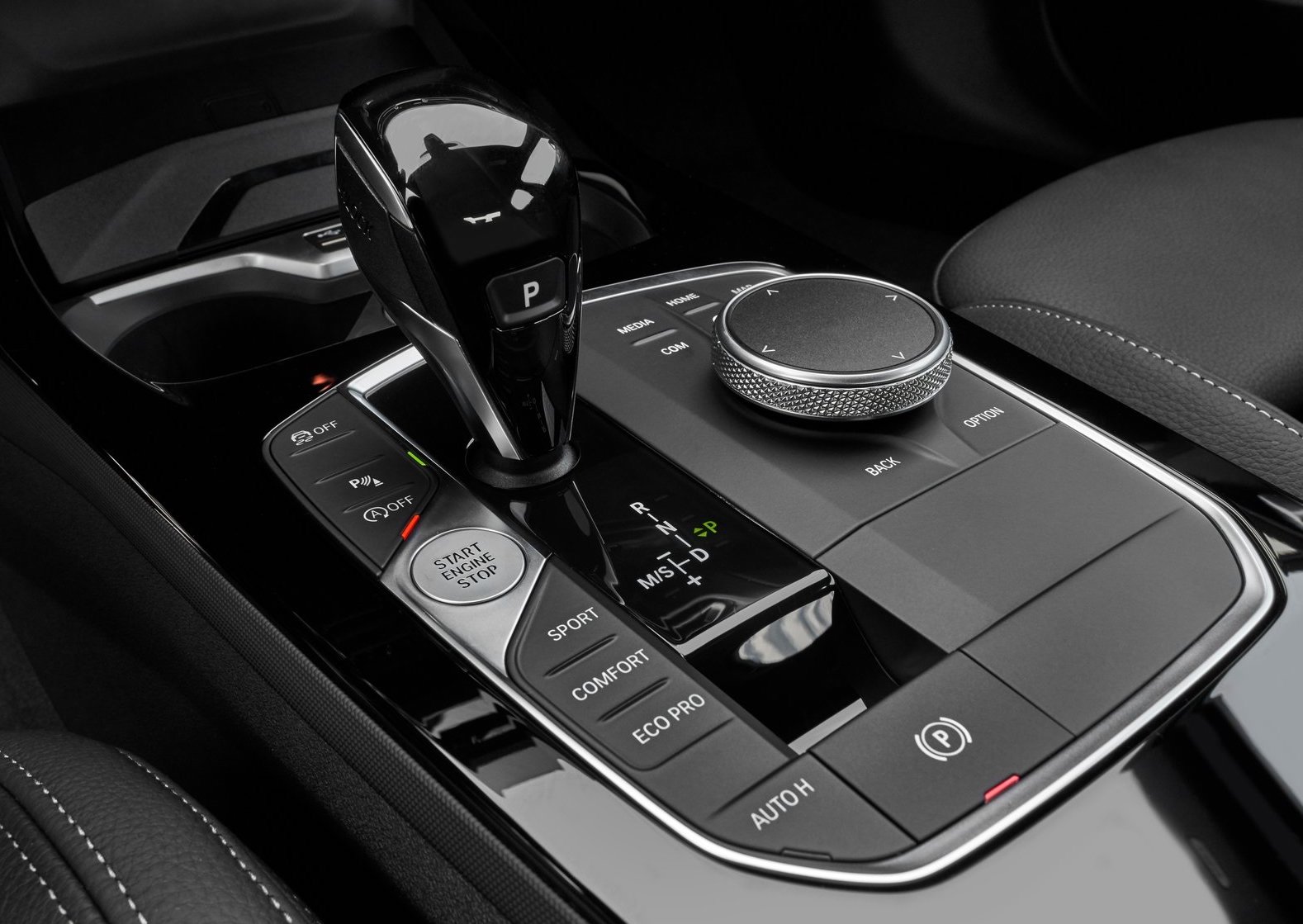
Interior
The interior of the first ever BMW 2-Series Gran Coupe combines sporting flair with exquisite materials and a use of space designed with both family life and long-distance journeys in mind. Innovative detail solutions such as the backlit trim strips underscore the modernity of the four-door coupe, while the interplay of different graining effects and texture elements behind the steering wheel, on the instrument panel and on the doors underscores the impression of dynamism and quality. Practical stowage areas further enhance the comfort and convenience factor. The various controls are geared squarely to the driver and grouped clusters make for easy operability. Access to the optional infotainment offering provided by the new BMW Operating System 7.0 – with optional gesture control – is via a large display grouping whose two large screens are available with a diagonal of up to 10.25 inches (with the BMW Live Cockpit Professional).
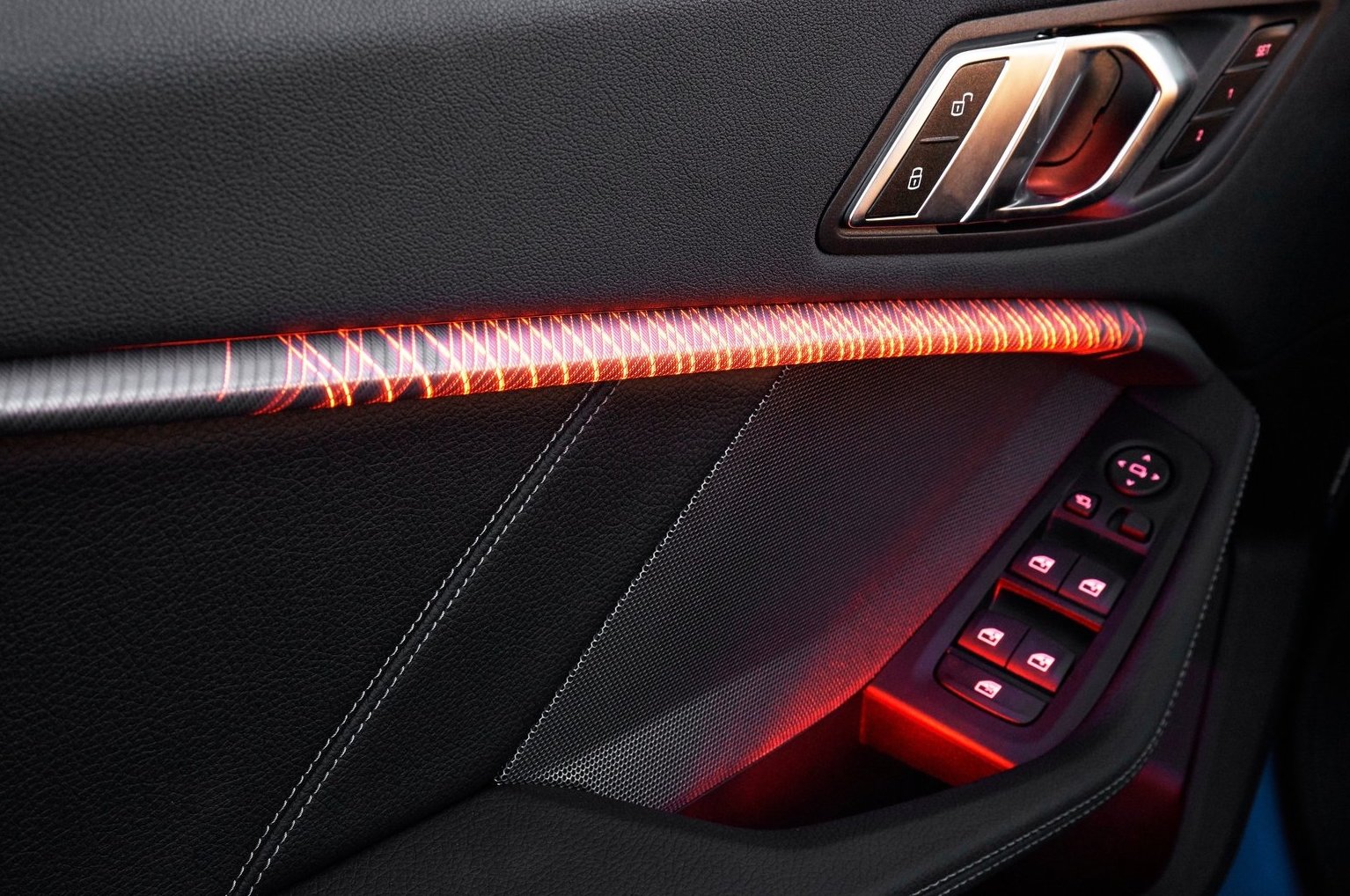
Generous rear knee-room and a large load compartment
The BMW 2-Series Gran Coupe belies its elegant coupe form with generous levels of cabin space – for which the car’s front-wheel-drive architecture (with transverse-mounted engines and a lower centre tunnel) can take a lot of credit. Rear passengers will be welcomed by significantly easier entry and 33 millimetres of extra kneeroom over the BMW 2-Series Coupe. The seating position is 12 millimetres higher and there is 14 millimetres more headroom when the optional panoramic roof is specified. The boot holds 430 litres of gear (40 litres more than the two-door coupe) and this can be expanded further by folding down the 40/20/40 split rear seat backrest. The rear bench can be released fully from the load compartment. The tailgate opens automatically at the press of a button or – if the optional Comfort Access is specified – with the wave of a foot.
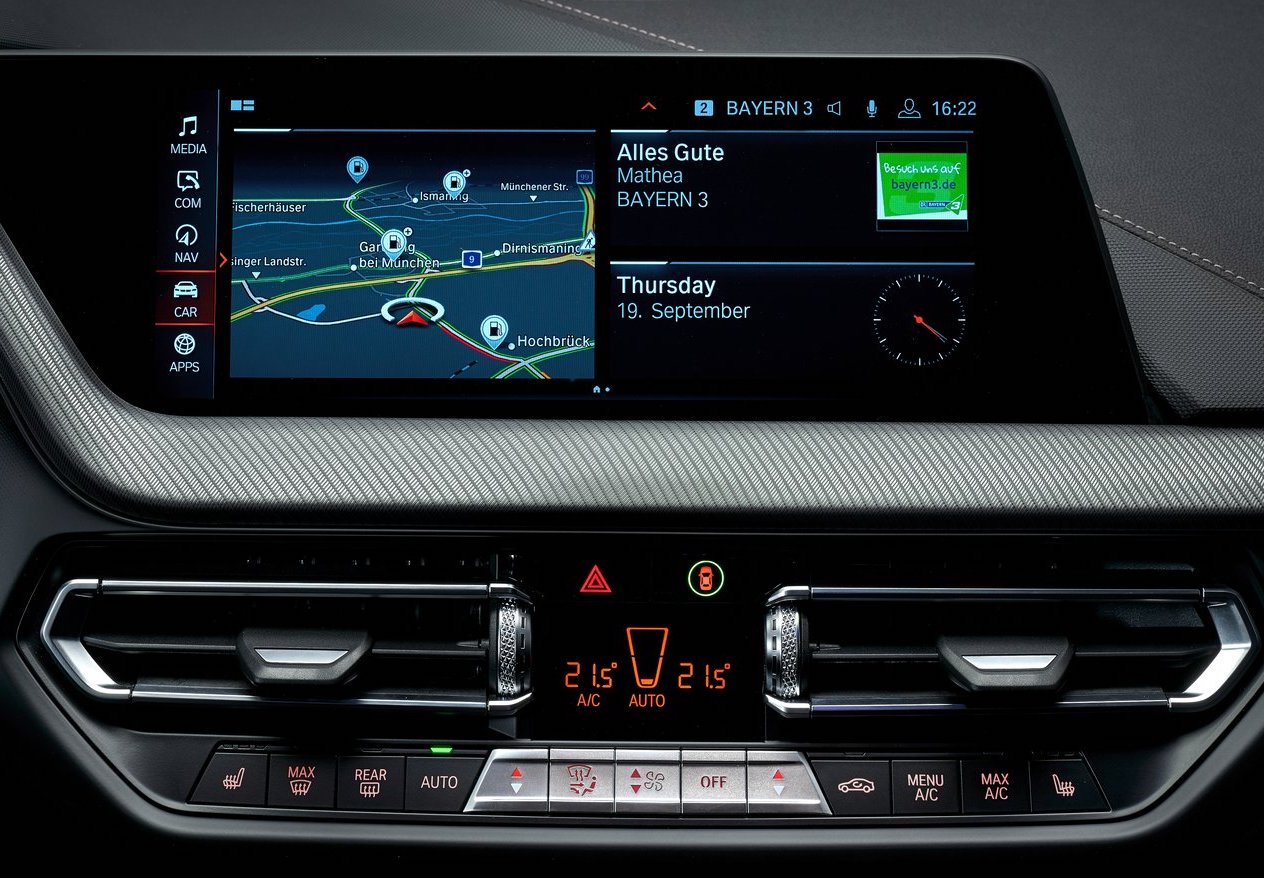
A cockpit focussed squarely on the driver
The BMW 2-Series Gran Coupe showcases itself as a genuine driving machine. The driver looks straight out to the (up to 10.25-inch) Info Display instrument cluster. The likewise 10.25-inch high-resolution Control Display is centrally mounted, touch-sensitive and angled towards the driver in customary BMW fashion; it is positioned perfectly in their line of sight. Together, the two screens form the BMW Live Cockpit Professional, a large display grouping which the driver can configure to their individual requirements. The full-colour 9.2-inch BMW Head-Up Display (optional) supplies the driver with information without requiring them to take their eyes off the road. The driver-focused layout is enhanced visually by trim strips which run towards the driver and by different graining effects and textures on the instrument panel and behind the steering wheel. Technical Orbis graining is used on the driver’s side in the cockpit area while leather-like Verona graining features on the passenger side, the two separated by contrast diagonal stitching, depending on the equipment line specified.
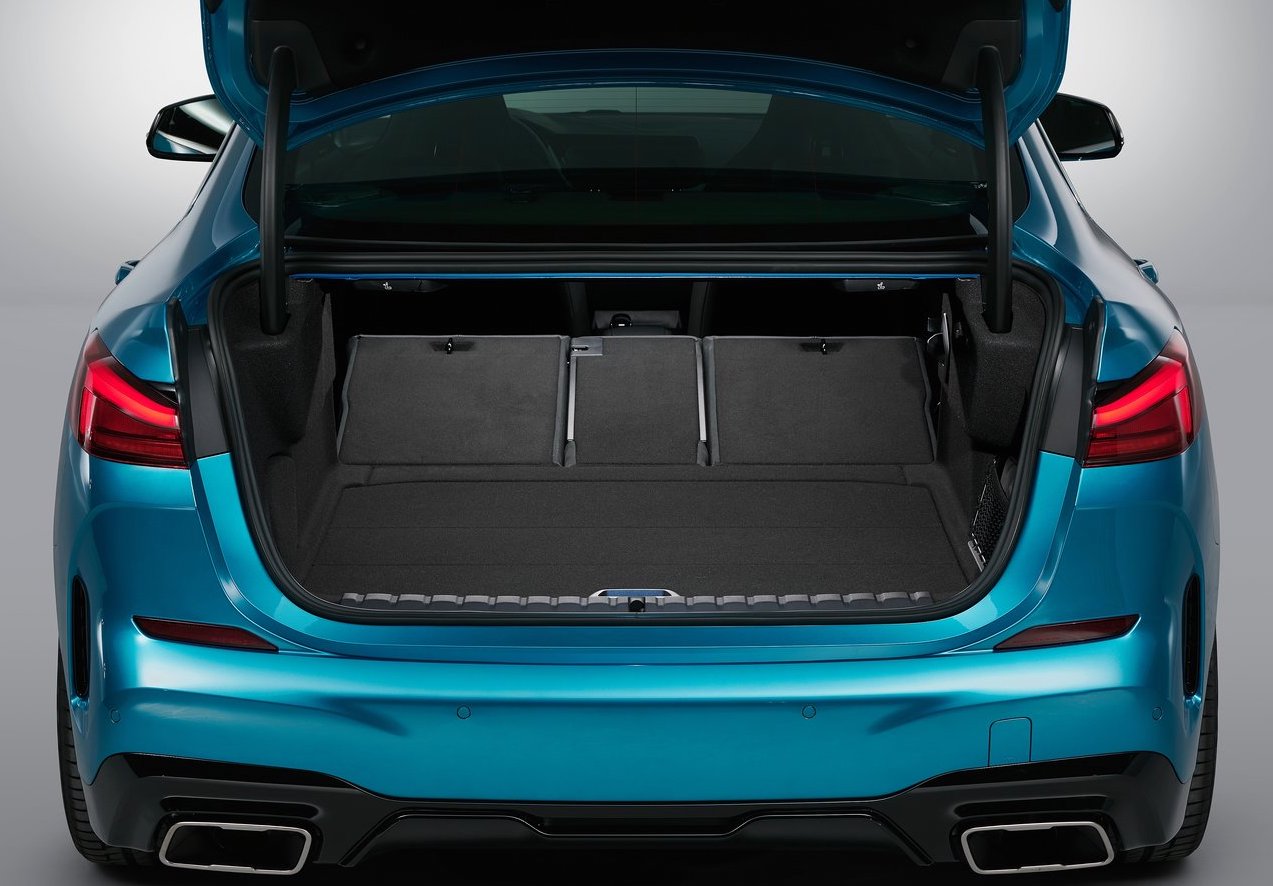
BMW Live Cockpit in modern design
The base BMW Live Cockpit and BMW Live Cockpit Plus including Navigation, intelligent voice control and Apple CarPlay preparation both have two classic analogue dials and a 5.1-inch, 4:3 portrait-format screen which displays information such as the car’s speed, the status of the driver assistance systems and navigation instructions.
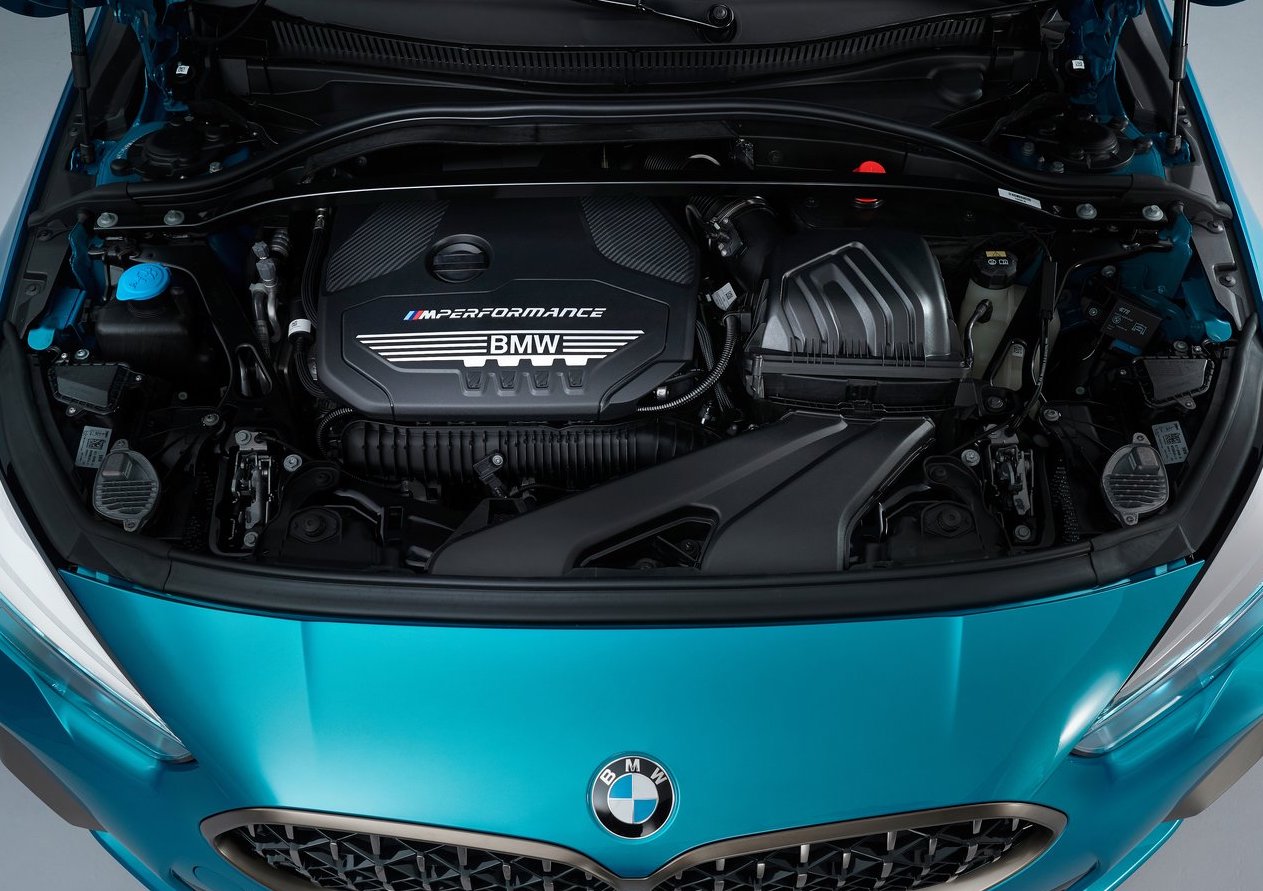
The form and arrangement of the digital BMW Live Cockpit Professional reference the signature BMW four-eyed face at the front end of the car. The rev counter runs anti-clockwise and, like the speedometer, has a new, up-to-date design. The space in the centre of the display shows navigation instructions, the current location of the vehicle and relevant information about the surrounding area for the rest of the journey. Alternatively, Assisted Driving View uses sensors integrated into the car to depict the area around it in real time; colour accents highlight activated driver assistance functions, such as the lane control assistant or Active Cruise Control (ACC). The displays showing the entertainment and radio station listings, the navigation and orientation maps and the new onboard computer read-out can be configured by the driver according to taste. The layout of content on the central Control Display, which is optimised for touch control but can also be specified with optional gesture control, can be personalised by adjusting the configuration of two to four pads per page. The pads at the highest level of the display show real-time data, so that the most important information can be absorbed at a glance.
As well as determining the colour and display content of the BMW Live Cockpit Professional, the Driving Experience mode selected now repeats the trick for the Control Display, creating a consistent appearance. Among the special details benefiting from this change is the personalised Welcome Scenario, with which the BMW Live Cockpit Professional greets the BMW 2-Series Gran Coupe driver. This feature can now include, as an option, the actual colour and equipment line of the car they are driving. The same goes for the display when calling up information on fuel consumption or fuel level via the “Car” menu item.
BMW Head-Up Display available as an option
The BMW Head-Up Display can be ordered as an option for the BMW 2-Series Gran Coupe. This system projects driving-related information onto an area of the windscreen measuring 9.2 inches in size, where the full-colour graphics appear directly in the driver’s field of vision and the information can be assimilated without the driver diverting their eyes from the road. The information shown by the BMW Head-Up Display includes the car’s speed, speed limits and overtaking restrictions, status indicators and warnings from the assistance systems, and route guidance and turn-off instructions. If the Active Cruise Control system is specified, distance warning shows an icon in the BMW Head-Up Display to alert the driver when they get closer to the vehicle in front than the pre-set minimum distance.
Grouped control clusters
The logical grouping of control clusters into functional units is one of the characteristic elements of current BMW interior design. The intuitive controls for the heating, air conditioning and hexagonal air vents are grouped together in the centre console below the Control Display. With the Start/Stop button and gear selector lever also located in the control panel in the lower section of the centre console, all the controls relating to driving functions are clustered together in one area. Situated to the right is the iDrive Controller – or the iDrive Touch Controller if the BMW Live Cockpit Plus or higher is specified – used to operate the infotainment system. In front of the selector lever is a practical stowage area which can be specified with the Wireless Charging option for smartphones.
Operation by means of iDrive Controller, touch, voice or gestures
The BMW 2-Series Gran Coupe allows the user to combine various operating options according to the situation at hand and their preferences. In addition to the usual buttons on the centre console and steering wheel, other frontline control elements include the iDrive Controller – with touchpad from BMW Live Cockpit Plus upwards – and the standard 8.8-inch Control Display with touchscreen functionality. BMW Live Cockpit Plus also adds a navigation system and intelligent voice control with online speech processing. Finally, there is the optional BMW Live Cockpit Professional, which also includes the BMW Intelligent Personal Assistant and is based on the new BMW Operating System 7.0. BMW Live Cockpit Professional brings together the fully digital display and operating system (including two 10.25-inch displays) with maximum connectivity and customisability. Standout features include an adaptive navigation system and a hard-drive-based multimedia system. The optional gesture control comprises seven different gestures, two of which can be assigned to functions of the customer’s choosing. The graphics in the Control Display can be personalised and are designed to always provide drivers with the right information at the right time.
Innovative backlit trim strips
The trim strips on the instrument panel and door panels of the BMW 2-Series Gran Coupe are finished as standard in matt Quartz Silver and Pearl-effect Chrome. As an option – or as part of higher equipment variants – customers can choose from another four high-quality trim surface designs. As in the BMW 1-Series, these innovative elements, with their compelling translucent properties, create a distinctive and appealing ambience. The driver can choose from six different colours for the lighting effect. The trim strips retain their normal appearance in daylight, but function as decorative lighting elements with a space-shaping effect in the dark. As well as choosing the colours involved, the driver can adjust the brightness of the ambient lighting to their tastes. The lighting is activated when the vehicle is unlocked or “Living” status is selected. The desired colour and the selected brightness level are stored in the personalised key.
Wide choice of seats and upholstery
There are three different front seats and a broad selection of covers – from cloth to leather – for the BMW 2-Series Gran Coupe. In base specification, the seats are upholstered in Anthracite-coloured Grid cloth. Options include sports seats with covers in Cloth/Sensatec and Sensatec in Black or Oyster (not available in Germany), or part-perforated Dakota leather in Magma Red with grey accents. Dakota leather with part-perforation in Black with grey highlights, Mocha with walnut-coloured accents and Oyster with grey highlights can also be ordered for the sports seats and standard seats. Sport Line cars include sports seats with Cloth/Sensatec covers in Anthracite with grey highlights, or the highlights can also be specified in Orange as an option. The sports steering wheel in Sport Line cars has a decorative aluminium-look insert. The sports steering is also included in the Luxury Line model, whose standard seats or optional sports seats are upholstered in Dakota leather. Standard features of the M Sport model and the BMW M235i xDrive are the M Sport steering wheel and the Trigon/Sensatec sports seats in Black or a variant with special BMW M piping and contrast blue stitching. M Sport seats with upholstery in Trigon cloth and Alcantara, plus integral head restraints and extendable seat cushions, can be ordered as an option for the M Sport model and BMW M235i xDrive. The M Sport seats are also available with perforated Dakota leather in Black or Magma Red, plus grey contrast stitching in each case.
Model variants and equipment lines
Luxurious or sporty – the dynamic new BMW 2-Series Gran Coupe offers customers an array of individualisation options in the form of a basic variant and five other equipment lines. The Luxury Line model focuses primarily on comfort and the sophisticated looks of the elegant four-door premium-compact coupe. And there are three levels of sporting focus, the Sport Line and M Sport models leading up to the flagship BMW M235i xDrive.
Basic and Advantage models
The basic version of the BMW 2-Series Gran Coupe already captures the imagination with its dynamically drawn lines. The BMW kidney grille surround comes in High-gloss Chrome, while the grille bars have a High-gloss Black painted finish. The front air intakes and window graphic surround in matt Black provide an appealing contrast. The exterior mirror caps and rear apron are painted in body colour. The Advantage model adds Park Distance Control (PDC), extended storage and cruise control with brake function (DCC) to the basic variant. These functionally effective equipment features are already included in the other models.
Sport Line model
The BMW kidney grille surround of Sport Line cars is also in gleaming Chrome, while the grille bars, the air intakes in the front apron and – as a no-cost option – the exterior mirror caps come in High-gloss Black. The window graphic surrounds are in BMW Individual High-gloss Shadowline, with a rear apron finished in Black.
Luxury Line model
Design elements in Aluminium satinated underscore the exclusive character of the Luxury Line. These include the BMW kidney grille bars and window graphic. The air intakes feature special trim in Aluminium satinated and High-gloss Black, the mirror caps are painted in body colour.
M Sport model
The M Sport option takes the BMW 2-Series Gran Coupe closer stylistically to the range-topping BMW M235i xDrive. Particularly eye-catching are the front apron with specially moulded air intakes and High-gloss Black trim elements, as well as the BMW M rear apron in Dark Shadow. Larger outlets channelling air from the rear wheel arches are also integrated into the rear bumper. As on Luxury Line cars, the BMW kidney grille surround is in Chrome, the grille bars are in Aluminium satinated and the mirror caps are painted in body colour. The window graphic surrounds have BMW Individual high-gloss Shadow Line trim.
BMW M235i xDrive
Exclusive visual cues and colour accents in Cerium Grey reinforce the status of the BMW M235i xDrive as the sporting flagship of the BMW 2-Series Gran Coupe range. This is the only model variant to feature a distinctive mesh design for the BMW kidney grille. The grille surround and three-dimensional mesh elements are in Cerium Grey, as are the additional bespoke bars in the outer air intakes and mirror caps. The other areas of the exterior mirrors and the BMW M rear apron come in High-gloss Black, and the window graphic surround adopts BMW Individual High-gloss Shadowline trim. The twin tailpipes with free-form embellishers and BMW M rear spoiler in body colour on the tailgate ensure the rear of the car cuts a striking figure.
Powertrain and chassis
Like the new BMW 1-Series, the first ever BMW 2-Series Gran Coupe employs BMW’s sophisticated front-wheel-drive architecture. The product of many years of experience amassed by the BMW Group with its front-wheel-drive models, this architecture also benefits from a transfer of technology from BMW i to the BMW core brand. The BMW 2-Series Gran Coupe brings together benchmark driving dynamics for its segment and a spacious interior.
Components team up to deliver excellent agility
The BMW 2-Series Gran Coupe handles with remarkable agility, both in front-wheel-drive guise and when BMW xDrive intelligent all-wheel drive is specified. This is the result of the perfectly orchestrated interaction between cutting-edge chassis engineering, innovative technologies and the integrated components and control systems affecting the car’s driving dynamics. The fast, precise responses of the BMW 2-Series Gran Coupe are clearly perceptible and elevate the driving experience to enviable heights.
Transfer of technology from the BMW i3
Credit for the fleet-footed agility of the BMW 2-Series Gran Coupe goes in part to the transfer of technology from BMW i to the BMW core brand. The near-actuator wheel slip limitation (ARB) tech familiar from the BMW i3s and fitted as standard in the BMW 2-Series Gran Coupe significantly improves traction when pulling away, cornering or accelerating on dry and wet roads, in mixed, snowy or icy conditions, and allows wheel slip to be controlled much more precisely and swiftly than before. ARB uses a slip controller positioned directly in the engine control unit rather than in the control unit for the DSC (Dynamic Stability Control) system. Eliminating long signal paths means that information is relayed three times quicker, while the driver perceives wheel slip being brought under control up to ten times faster. Near-actuator wheel slip limitation works in close tandem with the DSC system to significantly reduce power understeer – a typical drawback of front-wheel-drive cars – without the need for corrective inputs to stabilise lateral dynamics. Added to which, reducing friction improves steering feel, further adding to the sensation of nimbleness.
Neutral steering behaviour with BMW Performance Control
ARB is assisted in its task by the yaw moment distribution system BMW Performance Control. Also included as standard on the BMW 2-Series Gran Coupe, this feature increases handling agility by intelligently applying the brakes at the wheels on the inside of the bend before the slip threshold has been reached. This suppresses any initial understeer and gives the car neutral steering behaviour. Drivers can deactivate the DSC system if they wish to take over full control of the car’s sporty handling abilities.
When the DSC system is switched off, the EDLC (Electronic Differential Lock Control) function uses brake applications to simulate the effect of a mechanical limited-slip differential. Braking the unloaded front wheel on the inside of the bend prevents it from spinning and shifts drive power to the wheel on the outside of the bend, resulting in far greater grip when accelerating out of corners.
Alternatively, there is the option of the DSC system’s traction-optimising Dynamic Traction Control (DTC) setting, which allows a greater degree of slip at the driven wheels to maximise propulsive power. System intervention to stabilise the car becomes more muted, enabling it to pull away more effectively on slippery or loose surfaces and paving the way for a sportier driving style. This lets the driver control the BMW 2-Series Gran Coupe without any assistance until defined limits are reached – and therefore enjoy greater scope for exploring the car’s lateral dynamics at lower speeds.
Intelligent all-wheel drive in the BMW M235i xDrive
ARB technology and BMW Performance Control also feature on the BMW M235i xDrive, which is equipped with BMW xDrive intelligent all-wheel drive as standard. The system’s control logic varies the distribution of power between the front and rear wheels automatically and dynamically in response to the accelerator pedal position, engine torque, speed and steering angle. It can split drive 50:50 if necessary and is designed to ensure predictable handling in all driving situations. This applies even if the Driving Experience Control switch is set to Sport mode, DTC is selected or DSC is deactivated. In Comfort or Eco Pro mode, drive is apportioned as required, while keeping fuel consumption as low as possible. Fuel economy is therefore improved without any discernible impact on driving dynamics or traction.
As well as the all-wheel-drive system, standard specification for the sporty BMW M235i xDrive range-topper includes a newly developed mechanical Torsen limited-slip differential, which gives the car an even sharper dynamic edge by creating a locking effect between the front wheels. The differential is integrated into the standard-fit eight-speed Steptronic Sport transmission on the BMW M235i xDrive. The Launch Control function puts peak torque of 450 Nm (332 lb-ft) on tap in first and second gear.
High body rigidity using aluminium and high-strength steels
The body of the BMW 2-Series Gran Coupe makes intelligent use of aluminium – for the bonnet and tailgate, for instance – and high-strength steels. This material mix keeps weight down at the same time as imbuing the body structure with very high levels of bending and torsional stiffness. Bracing elements such as the standard boomerang-shaped strut in the vehicle’s rear section play an important role here.
An extra dose of sportiness for the BMW M235i xDrive
The positive dynamic impact of the torsionally rigid body is even more pronounced on the ultra-sporty, range-topping BMW M235i xDrive. In addition to the tower-to-bulkhead strut fitted on all models, it also benefits from a tower-to-tower strut, bracing elements on the front axle subframe and in the tunnel area, plus an anti-roll bar mounting with high preload, which provides excellent support for the body and a smooth ride. This all combines with the standard sports suspension and the M Sport steering – which has a more direct ratio (and therefore even sharper response) and whose power assistance is also varied according to road speed and lateral acceleration, reducing the steering effort required – to produce a further noticeable increase in the car’s agility and add to its already healthy appetite for corners. Handling poise at high speeds is enhanced by sophisticated aerodynamics that reduce lift at the front and rear axles. Meanwhile, the M Sport brakes offer excellent fade resistance and abundant reserves of stopping power at all times. The M Sport steering and M Sport brakes are also available as optional extras for other BMW 2-Series Gran Coupe models.
A choice of three suspension options
The standard suspension for the 2-Series Gran Coupe already has fine dynamic instincts and is specially tuned to the different engine variants. But customers can also dip into the options list to specify M Sport suspension with a 10 mm reduction in ride height or Adaptive suspension including VDC (Variable Damper Control). This particular variant lets the driver choose from two different damper response settings. The Driving Experience Control switch can be used to select either Comfort – for better ride comfort in poor road conditions – or Sport to major on dynamism. The anti-roll bar mounting with high preload is included with both the Adaptive suspension and M Sport suspension. All BMW 2-Series Gran Coupe models from entry level upwards have a multi-link rear axle.
Recommendations to suit individual tastes
The BMW 2-Series Gran Coupe may be the most dynamic model in its segment, but it still offers a broad choice of setups, ranging from comfortable to exceptionally sporty. In order to offer all its customers a car tailored to their dynamic preferences, BMW has come up with three optional recommendations. Drivers who are mainly attracted by the design of the BMW 2-Series Gran Coupe but are also looking for a cosseting ride will find the standard suspension offers the perfect blend of dynamism and comfort. Those keen to give their BMW 2-Series Gran Coupe a particularly sporty streak, meanwhile, can do so by opting for the M Sport suspension, complete with M Sport steering and the M Sport brakes. And combining the Adaptive suspension including VDC with the M Sport brakes offers the broadest possible spectrum between sportiness and comfort.
Engines
The new BMW 2-Series Gran Coupe will be available from launch with a choice of three engines – one diesel and two petrol – from the latest-generation BMW EfficientDynamics family. A raft of individual measures have been implemented to increase the efficiency of these three- and four-cylinder units, resulting in higher fuel economy in real-world driving conditions and lower exhaust emissions. Their responsiveness has likewise been enhanced, and in some cases output increased. The line-up is spearheaded by the BMW Group’s most powerful four-cylinder engine, which endows the BMW M235i xDrive all-wheel-drive model with super-sporty performance. A second AWD version of the new Gran Coupe – the BMW 228i xDrive – is available in the USA only.
Petrol units with myriad detail improvements
Among the 2-Series Gran Coupe variants powered by one of the upgraded petrol engines is the entry-level BMW 218i Gran Coupe. A process known as ‘form honing’ for machining the coated cylinder bores in the aluminium crankcase reduces piston friction loss in this unit. Further improvements are brought about by the opening and closing facility for the oil circuit (allowing on-demand operation of the piston cooling) and the one-piece chain drive for controlling the valve gear. The new belt drive for the generator, water pump, torsional vibration damper and air conditioning compressor has an L-shaped layout. The exhaust manifold is integrated into the aluminium cylinder head, minimising weight and optimising flow. Also made from aluminium, the turbocharger’s turbine housing is flange-mounted to the manifold package within the cylinder head so the flow dynamics of the recirculated exhaust gases can be utilised particularly efficiently.
The fuel pump and system of fuel lines have both been modified to enable petrol to be injected at higher pressure. Thermal management is optimised by a new coolant pump with separate outlets for cooling the cylinder head and engine block. This method of ‘split cooling’ uses a switchable valve to supply coolant to the cylinder head alone when the engine is still cold or operating at part-throttle. The engine reaches its operating temperature faster in this way, improving fuel consumption and exhaust emissions even under partial loads. The revised crankshaft now weighs 1.1 kilograms less than in the previous engine. The petrol engines all feature gasoline particulate filters, and so meet the strict Euro 6d-TEMP emissions standard.
In the 1.5-litre three-cylinder engine powering the BMW 218i, these measures combine to cut CO2 emissions by 29 g/km over the outgoing unit at the same time as boosting maximum power output by 3 kW (4 hp) to 103 kW (140 hp) between 4,600 and 6,500 rpm. Now five kilograms lighter than before, it generates peak torque of 220 Nm (162 lb-ft) from 1,480 rpm to 4,200 rpm. An overboost function briefly generates an extra 10 Nm (7 lb-ft) in fourth gear or higher. The BMW 218i accelerates from 0 to 100 km/h (62 mph) in 8.7 seconds and goes on to reach a top speed of 215 km/h (134 mph). It posts combined fuel consumption of 5.7 – 5.0 litres per 100 kilometres (49.6 – 56.5 mpg imp) with CO2 emissions of 131 – 114 grams per kilometre.
The BMW 228i xDrive model exclusive to the US market is equipped with a 2.0-litre four-cylinder engine with output of 170 kW (231 hp). Its peak torque of 350 Nm (258 lb-ft) is relayed to all four wheels as standard via the eight-speed Steptronic transmission and the BMW xDrive all-wheel-drive system.
BMW Group’s most powerful four-cylinder engine for the range-topper
Of the various engines available for the new BMW 2-Series Gran Coupe, it is the newly developed four-cylinder unit under the bonnet of the BMW M235i xDrive -and which also powers the BMW M135i xDrive and BMW X2 M35i – that really steals the show. This is the BMW Group’s most powerful four-cylinder engine, extracting 225 kW (306 hp) from its 2.0-litre displacement between 5,000 and 6,250 rpm with the help of BMW TwinPower Turbo technology. Its peak torque of 450 Nm (332 lb-ft) comes on stream at 1,750 rpm and stays there up to 4,500 rpm. The flagship model races to 100 km/h (62 mph) from rest in just 4.9 seconds (4.8 seconds with M Performance package), while top speed is limited to 250 km/h (155 mph). Despite such breathtaking performance figures, the BMW M235i xDrive posts fuel consumption of just 7.1 – 6.7 litres per 100 kilometres in the combined cycle (39.8 – 42.2 mpg imp) and emits a remarkably low 162 – 153 grams of CO2 per kilometre.
A reinforced crankshaft drive featuring a main bearing with a larger diameter, new pistons with an altered compression ratio and modified con rods with non-bushed ends plays a fundamental role in the performance of the BMW M235i xDrive. A larger turbocharger featuring a built-in exhaust manifold and integral diverter valve increases engine output and retains its thermodynamic efficiency up to exhaust temperatures of 1,025 degrees Celsius. Modified injectors have also been fitted to increase the flow volume. The capacity of the cooling package has been maximised with an independent transmission oil cooler that is separated from the engine’s coolant circuit, an electric 850-watt fan, two remote coolant radiators in the wheel arches and an enlarged expansion tank, ensuring that the BMW M235i xDrive is able to display its performance capabilities even under the most demanding conditions. The range-topping engine is assisted by a newly developed dual-branch exhaust system with minimal exhaust backpressure, which is instantly identifiable by the bespoke tailpipes with their free-form embellishers positioned on either side at the rear. The standard-fitted Active Sound Design (ASD) system amplifies the actual sound from the engine and modulates it so the driver is treated to an exhilarating sporting soundtrack without any increase in external noise emissions.
Powerful diesel engine with SCR emission control
The new BMW 2-Series Gran Coupe will also be available from launch with an efficient yet powerful diesel unit, featuring a diesel particulate filter, NOx adsorption catalyst and SCR (Selective Catalytic Reduction) technology. Major upgrades to the turbocharger and common-rail direct injection system have brought about a reduction in fuel consumption – and therefore CO2 emissions – of around five per cent, at the same time as lowering other pollutant emissions. The 2-litre four-cylinder BMW 220d meets the Euro 6d-TEMP emissions standard, but also generates output of 140 kW (190 hp) at 4,000 rpm and peak torque of 400 Nm (295 lb-ft) from 1,750 to 2,500 rpm. All of this means the sprint to 100 km/h (62 mph) from rest takes just 7.5 seconds, on the way to a top speed of 235 km/h (146 mph). The BMW 220d burns 4.5 – 4.2 litres of diesel for every 100 kilometres in the combined cycle (62.8 – 67.3 mpg imp) and emits 119 – 110 grams of CO2 per kilometre.
The engine in the 220d features two-stage turbocharging with a pair of turbochargers of different sizes, resulting in even sharper response and superior efficiency. The turbocharging system comprises a low-pressure stage with variable turbine geometry and a high-pressure stage integrated fully into the exhaust manifold. To further enhance responsiveness, both turbochargers are equipped with the latest slide bearing technology. This system is controlled by means of the low-pressure stage’s electrically adjustable charger vanes as well as the wastegate valve for the high-pressure stage and a compressor bypass, which are both operated pneumatically. This allows the combustion chambers to be supplied with just the right amount of compressed air given the driving situation and amount of power demanded by the driver.
A newly designed single-stage exhaust gas recirculation system ensures particularly effective reduction of nitrogen oxide emissions (NOX). And a refined system of sensors for the injector nozzles enables even more precise metering of the injected diesel, while maximum injection pressure has also been raised to 2,500 bar. The SCR system lowers nitrogen oxide levels in the exhaust gases by injecting a urea solution (AdBlue). The AdBlue tank can be topped up from AdBlue pumps at filling stations.
Three different transmission technologies deployed
BMW 2-Series Gran Coupe customers can choose from three different transmission technologies. In the BMW 218i, the engine’s power is relayed as standard via an upgraded six-speed manual gearbox, while the highly sophisticated seven-speed Steptronic dual-clutch transmission is available as an option. This transfers drive power to the wheels by means of two sub-transmissions (each with its own clutch), one of which is engaged and the other disengaged at all times. This allows the gears to be changed in a fraction of a second without any interruption in the flow of power – either via the automated control system or using the gear selector. The BMW 220i additionally comes with shift paddles on the steering wheel. The quick-shift control has been updated once again in the interests of rapid manual gear changes. The long seventh gear keeps revs low, helping to cut fuel consumption when out of town or on the motorway. The transmission can also let the car coast in neutral in certain situations, while a special low-viscosity oil brings about a further reduction in CO2 emissions.
Further improvements have been made to the shift comfort and acoustic properties of both the eight-speed Steptronic transmission fitted in the BMW 220d and the eight-speed Steptronic Sport transmission in the BMW M235i xDrive. Swift automatic gear changes ensure the car is driving in the highest possible gear, even when travelling at low speeds. The driver can also change gear manually using the shift paddles on the steering wheel (optional on the 220d).
Intelligent connectivity increases efficiency
Intelligent connectivity enables the two automatic transmissions to adapt their shift strategy according to the planned route and driving situation. If the BMW 2-Series Gran Coupe is equipped with a navigation system and Active Cruise Control with route-ahead assistant, the transmissions will factor in the data from these systems to avoid unnecessary gear changes midway through a quick succession of bends. When approaching a vehicle ahead, they also shift down early in order to use engine braking to scrub off speed.
The coasting and Auto Start Stop functions also take their cue from the data supplied by the navigation system, the front-mounted camera and the sensors for the optional driver assistance systems. The coasting function is available with the Driving Experience Control switch set to COMFORT mode as well as in ECO Pro mode, and will only decouple the powertrain in situations where performance and comfort are not compromised. If the driver suddenly lifts off the accelerator, the powertrain stays connected so that engine braking can be used to support the ensuing deceleration. For the same reason, powertrain disconnection is also prevented when approaching a junction. Inefficient engine shutdown by the Auto Start Stop function when stopping briefly at junctions or roundabouts is also avoided. Plus, the movement of vehicles ahead is monitored to determine the ideal moment for stopping and starting the engine.
Driver assistance systems
The BMW 2-Series Gran Coupe benefits from an array of innovative driver assistance systems filtering down from BMW models higher up the ladder. These systems lend the driver a helping hand both with the task of driving – in complex situations, for instance, or in monotonous driving conditions such as traffic jams and slow-moving traffic – and with parking. Depending on the system in question, camera images and data gathered by radar and ultrasonic sensors are used to monitor the vehicle’s surrounding area and either alert the driver to hazards or minimise the risk of an accident by means of corrective braking and steering.
The optional Cruise Control with braking function makes life easier on long-distance journeys by automatically accelerating or slowing the car to maintain the set desired speed. The Active Cruise Control system with Stop & Go function goes one step further by not just maintaining the chosen cruising speed, but also automatically keeping a safe distance from vehicles travelling ahead. A cruising speed between 30 and 160 km/h (19 – 99 mph) can be set manually or imported from the traffic sign recognition system. The system is able to brake the car to a stop if necessary – and also pull away again, either by itself or at the driver’s request, depending on how long the car has been stationary.
Standard equipment in Europe includes collision and pedestrian warning with city braking function, which also alerts the driver to the presence of cyclists. The system can even bring the BMW 2-Series Gran Coupe to a halt and so avoid a collision or minimise its consequences. Also fitted as standard is the Lane Departure Warning system with active lane return, which is operational from 70 to 210 km/h (44 – 130 mph). The optional Driving Assistant additionally comprises the Lane Change Warning system, which prompts the driver to guide the car back onto the correct lane at speeds from 20 to 250 km/h (12 – 155 mph) by means of a visual warning and, if necessary, a steering input. The Driving Assistant’s other functions include the route-ahead assistant, rear collision warning and crossing traffic warning, which reduces the risk of a collision when reversing into roads obstructed from the driver’s view.
Parking Assistant with innovative reversing assistant
Extensive assistance with parking and manoeuvring is also available as an option in the BMW 2-Series Gran Coupe. Park Distance Control (PDC) with sensors at both the front and rear offers the option of visual and acoustic signals to prevent collisions with obstacles located to the side or rear of the vehicle. A rear view camera can also be found on the options list. The optional Parking Assistant goes further still by offering automatic assisted parking in spaces that are either parallel or perpendicular to the road. This system takes care of steering the car, accelerating and braking, plus – on automatic models – making the necessary gear selections. On manual models, it is the driver who controls the direction of travel. The Parking Assistant is also capable of automatically manoeuvring out of parallel parking spaces.
The innovative reversing assistant already familiar from the BMW 1-Series and 3-Series helps the driver to exit parking spots or manoeuvre when space is limited and represents a further step towards automated driving. This optional feature offers the highly convenient facility of automated reversing in confined spaces or situations where the driver does not have a clear view, such as multi-storey car parks or entrances to courtyards. To do this, it stores the steering movements for any section the car has just driven forward along at no more than 36 km/h (22 mph). The system is then able to reverse the vehicle for distances of up to 50 metres by steering it along exactly the same line it took when moving forward. All the driver has to do is operate the accelerator and brake pedals and monitor the vehicle’s surroundings. The reversing assistant can back the car up at a maximum 9 km/h (5.5 mph).
BMW ConnectedDrive
The new BMW 2-Series Gran Coupe joins the recently arrived BMW 1-Series in setting new standards for connectivity in the premium compact class. It is available with the option of two smart services taken from BMW models higher up the ladder that will make the elegantly styled four-door coupe more user-friendly on a day-to-day basis: the BMW Digital Key and the BMW Intelligent Personal Assistant.
Turning a smartphone into a car key
Smartphones are becoming increasingly indispensable in today’s world, providing people with a communication and entertainment hub and even a digital payment method they carry with them at all times. Now, the smartphone is also able to replace a conventional car key for BMW 2-Series Gran Coupe drivers. If the Comfort Access option is specified, the BMW Digital Key allows the car to be locked and unlocked from a smartphone using Near Field Communication (NFC) technology. Holding the smartphone up to the door handle opens the car – even if the phone battery is dead. The engine can be started as soon as the phone has been placed in the smartphone tray or wireless charging tray. Accessible via BMW Connected once the owner’s identity has been checked, the Digital Key offers unrivalled flexibility, as the driver can share it with up to five other people. The BMW Digital Key is available for top-of-the-range NFC-capable Samsung Galaxy smartphones running Android 8.0 and above. Alternatively, the BMW Key Card can be used. This sophisticated option also features NFC technology allowing it to work in the same way as a suitably equipped smartphone. All of which makes it ideal for visits to the workshop or valet parking at a hotel or restaurant.
BMW Intelligent Personal Assistant: natural interaction with the vehicle expert
The BMW Intelligent Personal Assistant first seen in the BMW 3-Series Sedan also forms part of the control/operating concept for the BMW 2-Series Gran Coupe. Uttering the short prompt “Hey/Hi/Hello BMW” allows drivers to access various vehicle functions and obtain information simply by speaking. And the range of available functions and skills is constantly expanding thanks to regular updates, which can be carried out over the air on a smartphone and in-car with the help of the new Remote Software Upgrade facility.
The BMW Intelligent Personal Assistant is a digital character who can learn routines and habits and subsequently apply them in the appropriate context – or provide casual conversation, throwing in the occasional joke or relating interesting stories (“Hey BMW, do you feel sporty?”, “Hey BMW, tell me an anecdote”). He helps the driver, learns their preferences and is familiar with their favoured settings – e.g. for the seat heating – and the places they drive to frequently using the navigation system (“Hey BMW, take me home”). Saying “Hey BMW, I’m cold” will prompt him to adjust the temperature inside the car accordingly and switch the seat heating on. One unique feature over other digital assistants is that drivers can give this one a name of their choice (for example, “Hey Charlie”).
The BMW Intelligent Personal Assistant is first and foremost a genuine BMW expert. He is familiar with virtually all of the vehicle’s functions and is able to operate them as required or even explain them clearly if necessary (“Hey BMW, how does the High Beam Assistant work?”). The assistant can provide current status information (“Hey BMW, is the oil level okay?”) and help answer questions (“Hey BMW, what warning messages do I have?” or “Hey BMW, how far can I drive before I need to refuel?”). He can even activate a combination of the driver’s favourite settings to enhance their well-being. For instance, “Hey BMW, I feel tired” triggers the Caring Car vitality programme that adjusts the lighting mood, music and temperature, among other things, in order to make the driver feel more awake. Having the BMW Intelligent Personal Assistant at your side also makes light work of navigation, as he provides information on traffic jams along the route, searches for cafés in the area and finds free parking spaces at the destination.
State-of-the-art infotainment and sound systems
Needless to say, the BMW Intelligent Personal Assistant also makes it easy to access the user’s choice of music and seeks out radio stations to match. The standard BMW Stereo sound system with six speakers and 100-watt amplifier, optional BMW HiFi sound system with ten speakers and 205 watts or optional Harman Kardon surround sound system with 464 watts of audio power and a total of 16 speakers provide the requisite in-car audio experience.
https://youtu.be/MtOeo6zKsMU

